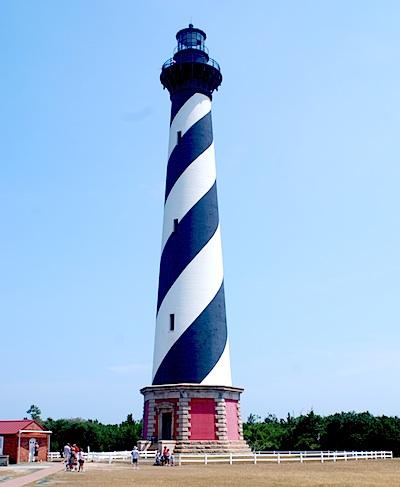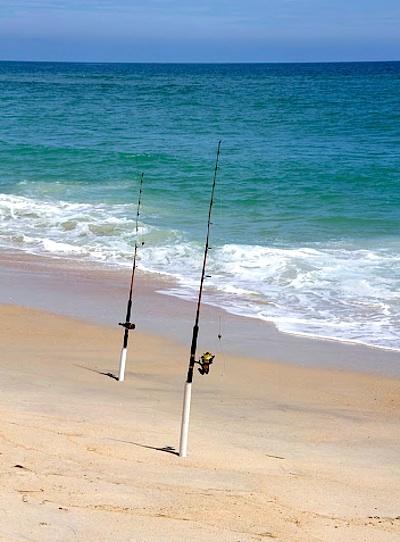
Climbing the Cape Hatteras Lighthouse offers panoramic views of the Outer Banks/Kurt Repanshek
Sun, salt spray, and sand are the main ingredients for a traditional Outer Banks vacation. Here on the North Carolina coast, where barrier islands bare the brunt of the Atlantic Ocean, families have been coming for decades to enjoy not only those aspects of summer but some of the best fishing along the Atlantic coast. The experience is so good that the National Seashore concept was born right here in 1937 when Congress authorized Cape Hatteras National Seashore.
Stretching more than 70 miles from Nags Head south to Ocracoke Inlet, the seashore draws those interested in history (during World War II the waters off the national seashore were thick with German U-boats that time and again targeted, and sank, unprotected merchant ships), surfcasting (fishing is particularly good in the fall when drum and bluefish are running), or simply flying a kite and enjoying the surf.
Towns that dot the seashore' Nags Head, Rodanthe, Salvo, Avon, Buxton, Frisco, Hatteras Village, and Ocracoke'are all popular destinations. So picturesque and romantic is Rodanthe that it was the backdrop for a 2008 movie starring Richard Gere and Diane Lane, Nights in Rodanthe. But the other towns are steeped in that seaside charm, too.
Visitors have a rich variety of activities to choose from: bird watching here along the Atlantic Flyway, shell hunting (winter and fall offer some of the best finds), fishing, of course, and solitude for early risers, late evening strollers, or simply walkers heading up or down the beach away from any crowds.
Campers have four campgrounds to consider'at Oregon Inlet, Frisco, Ocracoke, and Cape Point'and lighthouse lovers have three to admire' Ocracoke Light, Bodie Island Light, and Cape Hatteras Light (though access is only permitted to the last two).

Surf fishing is one of the top draws to Cape Hatteras National Seashore/NPS
History fans will find the restored Chicamacomico Lifesaving Station of interest. Crews from that station gained fame in 1918 when they braved burning waters to save 42 from the Mirlo, a gasoline-carrying British steamship that hit a mine planted by a German U-boat. The explosion ignited a layer of gasoline atop the ocean waters. According to historical accounts, the men rowed their surfboat through a 'hellish environment that blistered paint on their boat, burned their skin, and singed their hair and clothing...'
If You Go
Plan far ahead to make lodging reservations, as Cape Hatteras has a deep and loyal following of vacationers. Spring and fall are the best times to fish; by the middle of summer fishing is best offshore. Winter fishing can be productive, but the weather is harsh and sometimes dangerous.
Winds that sweep across Pamlico Sound on the back side of the barrier islands produce excellent windsurfing and kite boarding. Many windsurfers and kite boarders use the Salvo Day Use and Haulover day use areas on Hatteras Island.
Ocracoke Inlet was the favorite anchorage of the notorious pirate Blackbeard (Edward Teach). Blackbeard was finally killed in a battle near there on November 22, 1718. His decapitated body was thrown overboard into the inlet.



Comments
I second Buxton's motion. All in favor?
Ignoring the Tea Party and the harm their proposals will cause if they come to pass would be disastrous. The foolishness and potential harm of it all needs to be exposed lest it actually come to pass. Satire is an often effective means of exposing foolishness.
ECBuck, maybe they can make you head realtor at Teabaggistan National Park. You can help initiate the sale of the public land and naming rights to Cabellas, and they can rename it Camoland National Corporate Amusement Park.
In all seriousness, and sadly, even if this is just a poor attempt at satire, this exact scenario is playing out with the Cape Hatteras National Seashore with these ORV groups. You guys can stick your heads in the sand and deny it, but these ORV groups are attempting to undermine the Park, and its overall mission.
And if you paid any attention, Gary, instead of just casting apertions, you would have noted that I have not supported either side in this argument other than asking for substantiation of facts. In fact, I was the only one to ask Beach to substantiate his claim Fish and Wildlife had found the management plan ineffective and when he produced a document, I pointed out it fell short of saying the plan was ineffective.
People here have a difference of visions. Some believe the parks need to be more wilderness others believe recreation is a valid component. That doesn't mean either side is "bad" or that sexual slurs need to be used. Grow up. Respect people and maybe they will give your arguments more respect.
Folks, we're going to shut this thread down. At the same time, I would have to agree that comments -- on both sides of this issue -- have gotten away from civil discourse, a disturbing development of late.
There are several ways we can handle this sort of problem in the future: simply do away with comments; ban those who can't discuss issues surrounding the parks constructively and without demeaning or disparaging others; require folks to use their real, full, names with hopes that will persuade them to be civil.
For those who haven't taken the time to read Traveler's Code of Conduct, here it is:
Please take this to heart and think twice before you hit that "post" button.